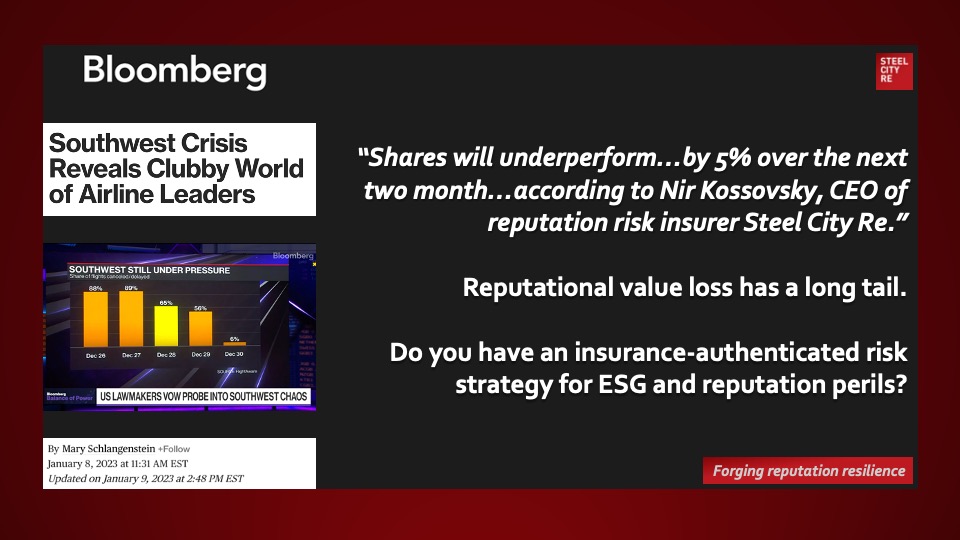Delayed Maintenance Creates Reputation Risk
Delayed maintenance creates reputation risk. In the aftermath of a meltdown that led to 16,700 flight cancellations and may cost the airline more than $800 million, blame has fallen on an outmoded crew scheduling system and an unusual point-to-point route network. […] Southwest has acknowledged putting updates to its crew scheduling system behind other improvements, despite long-standing complaints from pilots and flight attendants.
Click on the image above to read more (Bloomberg Paywall).

Shares will underperform…by 5% over the next two month…according to Nir Kossovsky, CEO of reputation risk insurer Steel City Re.
Bloomberg: January 11, 2023

Steel City Re is an insurance intermediary and risk advisor for reputation value and ESG-linked reputation risk. We offer solutions for measuring reputational risk and reputational value, governance strategies for overseeing reputation risk management frameworks, insurance, and reinsurance. Reputation and ESG insurance and reinsurance are strategic instruments boards use to signal to investors, bond raters, and the courts (and regulators) that their governance processes are effective.
Reputation is Mission-Critical
Delayed maintenance creates reputation risk. Oversight of “mission- critical” issues can forestall adverse issues. A program for reputation resilience, comprising both risk management and insurance (reinsurance)-authenticated oversight for all that is mission-critical, can create value in many ways. To this end, Steel City Re offers a Reputation Resilience Program.
Having a robust Reputation Resilience Program in place offers, amongst other benefits:
- Protection for the company, its staff, executives, and board from litigation and regulatory challenges
- Improved governance processes and better enterprise risk management protocols; i.e., measuring reputational risk
- Establishment of an agile operating, communications, and decision-making team, with clear roles and responsibilities, trained and ready to handle all reputational threats; i.e., a reputation risk management framework
- Proactive management of risks that could give rise to delays or derailing concerns around new product and strategic partnership launches
- Captured behavioral economic value from stakeholders; i.e., value of reputation
- Reduced costs of debt and risk transfer while boosting equity value; i.e., boosting reputational value
A hazard of reputation risk is a lurking gap between stakeholder expectations and reality. Another hazard is the emotional intensity associated with expectations. The peril is anger from disappointed stakeholders. This video and this written summary explain the behavioral economic features of the many perils of reputation risk.
Mitigating risk strategically through expectation management and operational adjustments evinces thoughtful management and dutiful governance. Financing such risks evinces prudence, and doing so publicly enables stakeholders to appreciate and value the effort. These comprise the core of Steel City Re’s professional services.
One Question
Delayed maintenance creates reputation risk.. ESG-linked reputation risks are prevalent and material. Are reinsurance and insurance for ESG-linked reputation risk part of your strategy?

